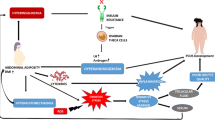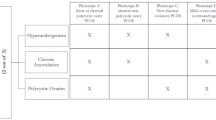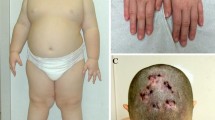Abstract
Polycystic ovary syndrome (PCOS) is the major cause of anovulatory infertility. Although the genetic basis of PCOS is not well understood, it is a common metabolic and endocrine disorder. This study investigates the possible genomic variants associated with PCOS in Pakistani women from the Punjab region. DNA samples from 96 patients with genetically unrelated PCOS and 96 controls were analyzed by direct sequencing to determine the polymorphisms of different loci on follicle-stimulating hormone receptor (fshr), follicle-stimulating hormone β (fshrβ), luteinizing hormone chorionic gonadotropin (lhcgr), luteinizing hormone β (lhβ), estrogen receptor α (esr1), and estrogen receptor β (esr2) genes. Significant associations were observed within the genotype frequencies, allele frequencies, and multi-single-nucleotide polymorphism (SNP) haplotype analysis of most polymorphisms studied. This study identified new SNPs at positions 605+52 Del/T in lhcgr genes occurring in this particular subpopulation. The strong r2 value suggests that polymorphisms in the fshr and esr1 genes were in linkage disequilibrium. Our study provides evidence of statistically significant associations between susceptibility to PCOS in Pakistani women and the gene polymorphisms mentioned earlier. This suggests that the susceptible loci for PCOS lie within or very close to the chromosomal regions spanning these genes.
Similar content being viewed by others
References
Goodarzi MO, Dumesic DA, Chazenbalk G, Azziz R. Polycystic ovary syndrome. Etiology, pathogenesis and diagnosis. Nat Rev Endocrinol. 2011;7(4):219–231.
Brassard M, AinMelk Y, Baillargeon JP. Basic infertility including polycystic ovary syndrome. Med Clin North Am. 2008;92(5): 1163–1192.
Stein IF, Leventhal ML. Amenorrhea associated with bilateral polycystic ovaries. Am J Obstet Gynecol. 1935;29:181–91.
Rotterdam ESHRE/ASRM-Sponsored PCOS consensus workshop group. Revised 2003 consensus on diagnostic criteria and long-term health risks related to polycystic ovary syndrome (PCOS). Hum Reprod. 2004;19(1):41–47.
de Castro F, Ruiz R, Montoro L, et al. Role of follicle-stimulating hormone receptor Ser680Asn polymorphism in the efficacy of follicle-stimulating hormone. Fertil Steril. 2003; 80(3):571–576.
Jun JK, Yoon JS, Ku SY, et al. Follicle-stimulating hormone receptor gene polymorphism and ovarian responses to controlled ovarian hyperstimulation for IVF-ET. J Hum Genet. 2006;51(8): 665–670.
Tong Y, Liao WX, Roy AC, Ng SC. Association of AccI polymorphism in the follicle-stimulating hormone beta gene with polycystic ovary syndrome. Fertil Steril. 2000;74(6):1233–1236.
Yang CQ, Chan KY, Ngan HY, et al. Single nucleotide polymorphisms of follicle-stimulating hormone receptor are associated with ovarian cancer susceptibility. Carcinogenesis. 2006; 27(7):1502–1506.
Urbanek M. The genetics of the polycystic ovary syndrome. Nat Clin Pract Endocrinol Metab. 2007;3(2):103–111.
Gharib SD, Wierman ME, Shupnik MA, Chin WW. Molecular biology of pituitary gonadotropins. Endocr Rev. 1990;11(1): 177–199.
Moyle WR, Campbell RK. Gonadotropins. In: Adashi EY, Rock JA, Rosenwalks Z, eds. Reprod Endocrinol Surg Technol. Philadelphia: Lippincott-Raven; 1996; 683–724.
Shi Y, Zhao H, Cao Y, et al. Genome-wide association study identifies eight new risk loci for polycystic ovary syndrome. Nat Genet. 2012;44(9):1020–1025.
Mutharasan P, Galdones E, Penalver B, et al. Evidence for chromosome 2p 16.3 polycystic ovary susceptibility locus in affected women of European ancestry. J Clin Endocrinol Metab. 2013;98(1):E185–E190.
Dolfin E, Guani B, Lussiana C, Mari C, Restagno G, Revelli A. FSH-receptor Ala307Thr polymorphism is associated to polycystic ovary syndrome and to a higher responsiveness to exogenous FSH in Italian women. J Assist Reprod Genet. 2011;28(10): 925–930.
Du J, Zhang W, Guo L, et al. Two FSHR variants, haplotypes and meta-analysis in Chinese women with premature ovarian failure and polycystic ovary syndrome. Mol Genet Metab. 2010;100(3): 292–295.
Bon-Hee GU, Jung-MI P, Kwang-Hyun B. Genetic variations of follicle stimulating hormone receptor are associated with polycystic ovary syndrome. Int J Mol Medc. 2010;26(1):107–112.
Livshyts G, Podlesnaja S, Kravchenko S, Sudoma I, Livshits L. A distribution of two SNPs in exon 10 of the FSHR gene among the women with a diminished ovarian reserve in Ukraine. J Assist Reprod Genet. 2009;26:29–34.
Orio FJ, Ferrarini E, Cascella T, et al. Genetic analysis of the follicle stimulating hormone receptor gene in women with polycystic ovary syndrome. J Endocrinol Invest. 2006;29(11):975–982.
Hegele-Hartung C, Siebel P, Peters O, et al. Impact of isotypeselective estrogen receptor agonists on ovarian function. Proc Natl Acad Sci. 2004;101(14):5129–5134.
Jakimiuk AJ, Weitsman SR, Yen HW, Bogusiewicz M, Magoffin DA. Estrogen receptor alpha and beta expression in theca and granulosa cells from women with polycystic ovary syndrome. J Clin Endocrinol Metab. 2002;87(12):5532–5538.
Yariz KO, Walsh T, Uzak A, et al. Inherited mutation of the luteinizing hormone/choriogonadotropin receptor (LHCGR) in empty follicle syndrome. Fertil Steril. 2011;96(2):e1250–e1230.
Balen AH. Hypersecretion of luteinizing hormone and the polycystic ovary syndrome. Hum Reprod. 1993;8(suppl 2):123–128.
Norman RJ, Dewailly D, Legro RS, Hickey TE. Polycystic ovary syndrome. Lancet. 2007;370(9588):685–697.
Huhtaniemi I, Alevizaki M. Gonadotrophin resistance. Best Pract Res Clin Endocrinol Metab. 2006;20:561–576.
Huhtaniemi IT, Themmen AP. Mutations in human gonadotropin and gonadotropin-receptor genes. Endocrine. 2005;26(3):207–217.
Sambrook J, Fritschi EF, Maniatis T. Molecular Cloning: A Laboratory Manual. New York: Cold Spring Harbor Laboratory Press, 1989.
Hawley ME, Kidd KK. HAPLO, a program using the EM algorithm to estimate the frequencies of multi-site haplotypes. J Heredity. 1995;86(5):409–411.
Dempster AP, Laird NM, Rubin DB. Maximum likelihood from incomplete data via the EM algorithm. J Royal Stat Soc Series. 1977;39(1):1–22.
Li L, Yang D, Chen X, Chen Y, Feng S, Wang L. Clinical and metabolic features of polycystic ovary syndrome. Int J Obstet Gynecol. 2007;97(2):129–134.
Shi Y, Guo M, Yan J, et al. Analysis of clinical characteristics in large-scale Chinese women with polycystic ovary syndrome. Neuro Endocrinol Lett. 2007;28(6):807–810.
Liu N, Ma Y, Wang S, et al. Association of the genetic variants of luteinizing hormone, luteinizing hormone receptor and polycystic ovary syndrome. Reprod Biol Endocrinol. 2012;10:36.
Tong Y, Liao WX, Roy AC, Ng SC. Absence of mutations in the coding regions of follicle-stimulating hormone receptor gene in Singapore Chinese women with premature ovarian failure and polycystic ovary syndrome. Horm Metab Res. 2001;33(4): 221–226.
Liao WX, Tong Y, Roy AC, Ng SC. New AccI polymorphism in the follicle-stimulating hormone beta-subunit gene and its prevalence in three Southeast Asian populations. Hum Hered. 1999; 49(3):181–182.
La Marca A, Papaleo E, Alviggi C, et al. The combination of genetic variants of the FSHB and FSHR genes affects serum FSH in women of reproductive age. Hum Reprod. 2013;28(5):1369–1374.
Lamminen T, Huhtaniemi I. A common genetic variant of luteinizing hormone; relation to normal and aberrant pituitary–gonadal function. Eur J Pharmacol. 2001;414(1):1–7.
Lamminen T, Jiang M, Manna PR, et al. Functional study of a recombinant form of human LHβ-subunit variant carrying the Gly102Ser mutation found in Asian populations. Mol Hum Reprod. 2002;8(10):887–892.
Takahashi K, Karino K, Kanasaki H, et al. Influence of missense mutation and silent mutation of LHb-subunit gene in Japanese patients with ovulatory disorders. Eur J Hum Gen. 2003;11(5): 402–408.
Nectaria X, Leandros L, Ioannis G, Agathocles T. The importance of ERa and ERb gene polymorphisms in PCOS. Gynecol Endocrinol. 2012;28(7):505–508.
Sundarrajan C, Liao WX, Roy AC, Ng SC. Association between estrogen receptor-beta gene polymorphisms and ovulatory dysfunctions in patients with menstrual disorders. J Clin Endocrinol Metab. 2001;86(1):135–139.
Author information
Authors and Affiliations
Corresponding author
Rights and permissions
About this article
Cite this article
Liaqat, I., Jahan, N., Krikun, G. et al. Genetic Polymorphisms in Pakistani Women With Polycystic Ovary Syndrome. Reprod. Sci. 22, 347–357 (2015). https://doi.org/10.1177/1933719114542015
Published:
Issue Date:
DOI: https://doi.org/10.1177/1933719114542015




